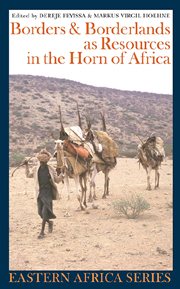Book contents
- Frontmatter
- Contents
- List of Maps, Tables & Charts
- Preface by Günther Schlee
- Editors' Preface
- Notes on Contributors
- List of Acronyms
- 1 State Borders & Borderlands as Resources
- 2 More State than the State?
- 3 Making Use of Kin beyond the International Border
- 4 The Tigrinnya-speakers across the Borders
- 5 Trans-Border Political Alliance in the Horn of Africa
- 6 People & Politics along & across the Somaliland-Puntland Border
- 7 The Ethiopian-British Somaliland Boundary
- 8 The Opportunistic Economies of the Kenya-Somali Borderland in Historical Perspective
- 9 Magendo & Survivalism
- 10 Can Boundaries not Border on One Another?
- 11 Conclusion
- Index
- EASTERN AFRICAN STUDIES
11 - Conclusion
Putting back the Bigger Picture
Published online by Cambridge University Press: 05 April 2013
- Frontmatter
- Contents
- List of Maps, Tables & Charts
- Preface by Günther Schlee
- Editors' Preface
- Notes on Contributors
- List of Acronyms
- 1 State Borders & Borderlands as Resources
- 2 More State than the State?
- 3 Making Use of Kin beyond the International Border
- 4 The Tigrinnya-speakers across the Borders
- 5 Trans-Border Political Alliance in the Horn of Africa
- 6 People & Politics along & across the Somaliland-Puntland Border
- 7 The Ethiopian-British Somaliland Boundary
- 8 The Opportunistic Economies of the Kenya-Somali Borderland in Historical Perspective
- 9 Magendo & Survivalism
- 10 Can Boundaries not Border on One Another?
- 11 Conclusion
- Index
- EASTERN AFRICAN STUDIES
Summary
The detailed studies presented in this book have amply demonstrated that the state frontiers of the Horn, no matter how arbitrarily and indeed sometimes brutally they have been imposed, nonetheless provide a host of opportunities for the peoples who live on either side of them. Members of borderland communities travel one way or the other as smugglers or in order to swell the votes of their kinsfolk during elections on either side of the border. Guerrillas and clan-militias prepare for armed forays across frontiers in order to support their kin in power struggles against other groups, or weaken much hated authoritarian governments. Hoehne showed that in the contested borderlands between Somaliland and Puntland, Warsangeeli and Dhulbahante Somalis not only change allegiance between the two emerging state administrations, but may even turn up in high government office first on one side, then on the other – and, as Cedric Barnes makes clear, Somalis have been making use of these opportunities for a very long time. Refugees who cross the frontiers between Sudan and Ethiopia, Eritrea and Sudan, or Somalia and Kenya, find at least in their camps across the border conditions less intolerable than those they have felt obliged to leave behind, and gain some access to international humanitarian resources – even, in the case of the Somali/Tanzanian Zigula, to a new national citizenship. The ubiquitous khat or miraa sneaks unstoppably across the borders that separate its producers from its consumers.
- Type
- Chapter
- Information
- Borders and Borderlands as Resources in the Horn of Africa , pp. 187 - 196Publisher: Boydell & BrewerPrint publication year: 2010



